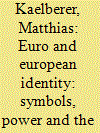|
|
|
Sort Order |
|
|
|
Items / Page
|
|
|
|
|
|
|
| Srl | Item |
| 1 |
ID:
051734


|
|
|
|
|
| Publication |
April 2004.
|
| Summary/Abstract |
Clifford Geertz has noted recently that 'more than any other single thing, it has been the rising tendency to ideologize faith in so much of the Muslim world that has made it increasingly hard to arrive at summary accounts of what is happening there'. This recognition has not deterred the emergence of a veritable flood of literature, scholarly or otherwise, much of which provides sweeping holistic accounts of 'Islam' and the West's current engagement with it. The difficulty Geertz highlights is, ironically, also the impetus that drives the current hunger for such knowledge at the popular, academic and policy levels: the recognition of Islam, in its multifarious manifestations, not as a stagnant and ritualistic historical artefact, but as the major component of cultural renaissance and prime vehicle of dissident political mobilisation in the contemporary Muslim world.
|
|
|
|
|
|
|
|
|
|
|
|
|
|
|
|
| 2 |
ID:
051730


|
|
|
|
|
| Publication |
April 2004.
|
| Summary/Abstract |
This article assesses the relationship between money, collective identity, and European integration. The recent move of the European Union (EU) toward a common currency - the euro - seems to contradict the conventional 'one nation/one money' assumption about the association between states, territory and money creation. However, from a broad macro-historical perspective, the process of European monetary unification is not as exceptional and unique as it is often made out to be. I argue that the relationship between money and collective identity is reciprocal. On the one hand, money is a purposeful political tool in the construction of identities. On the other hand, in order to function properly, money requires some degree of collective identity among its users. Thus, the article examines the role of the euro as part of an explicit project to facilitate the development of a European identity as well as the required level of European identity necessary for a successful functioning of the euro. The key identity aspect at stake in the relationship between money and identity is not an affective relationship between citizens and country, but rather a relationship of trust. During the process of modernisation, trust has become rather abstract and institutionalised. To support a modern relationship of trust, identity does not have to rest on deep affective feelings of belonging. Diffuse identity, based on utilitarian or contractual factors and as part of evolving hybrid identity structures, is sufficient
|
|
|
|
|
|
|
|
|
|
|
|
|
|
|
|
| 3 |
ID:
051731


|
|
|
|
|
| Publication |
April 2004.
|
| Summary/Abstract |
Recent trends in Democratic Peace theory have called into question the orthodox 'separate democratic peace' position that liberal states are peace-prone only in relations with other liberal states. This article seeks to recast the bases and scope (or parameters) of the relationship between liberalism - primarily left-liberalism - in domestic politics and peace-proneness in foreign affairs, to the effect that whilst this is manifest more broadly than conventionally understood, it is far from universal or undifferentiated. Whilst liberal 'norms' - as indicators of the legitimacy of force - are an important factor in determining when liberals will and will not support the use of force, liberals are also shown to have a higher threshold for the use of force than other groups on the mainstream domestic political spectrum (usually to the Right), indicating greater unwillingness to use force. The cases examined are reasonably neutral, not cherry-picked, in that they are drawn from the three major conflicts of the twentieth century and, as a starting point for the examination of liberal imperialism, Gladstone's Second Ministry (1880-1885). Whilst the above findings are presented as highly significant for understanding the character of liberal peace-proneness and an advance on the separate democratic peace position, the argument is necessarily qualified in an effort to reflect the political complexities of the phenomenon and the limitations of liberal norms as an explanatory factor. It is, however, these very qualifications that put the politics back into the research agenda and connect the knowledge claims to a wider body of academic scrutiny which, ultimately, should lead to a fuller understanding of the relationship between liberalism, democracy and peace. Footnotes 1 Part of this article was written whilst the author was a Research Fellow at the Norwegian Nobel Institute, Oslo. The author would like to thank participants in a research seminar at the Institute and also John Horton, Dan Keohane, and, especially, Bruce Russett for comments on an earlier version of this article. The usual caveat applies.
|
|
|
|
|
|
|
|
|
|
|
|
|
|
|
|
| 4 |
ID:
051733


|
|
|
|
|
| Publication |
April 2004.
|
| Summary/Abstract |
Social constructivism has come of age in contemporary international relations (IR) theory. Indeed, more and more submissions to presses and journals in both Europe and America characterise themselves as constructivist or situate their arguments vis à vis those of constructivists. In substantive terms and as the three books under review attest, constructivists also now offer detailed empirical studies that amplify and enrich their earlier conceptual and meta-theoretical critiques of mainstream approaches. Yet, as with any maturing research programme, there are gaps to be filled and challenges to be met. These include a better appreciation and theorisation of domestic politics; more explicit attention to research methods; further work on the linguistic turn so central to much of constructivism; and, finally, a rethink of attempts to build bridges.
|
|
|
|
|
|
|
|
|
|
|
|
|
|
|
|
|
|
|
|
|